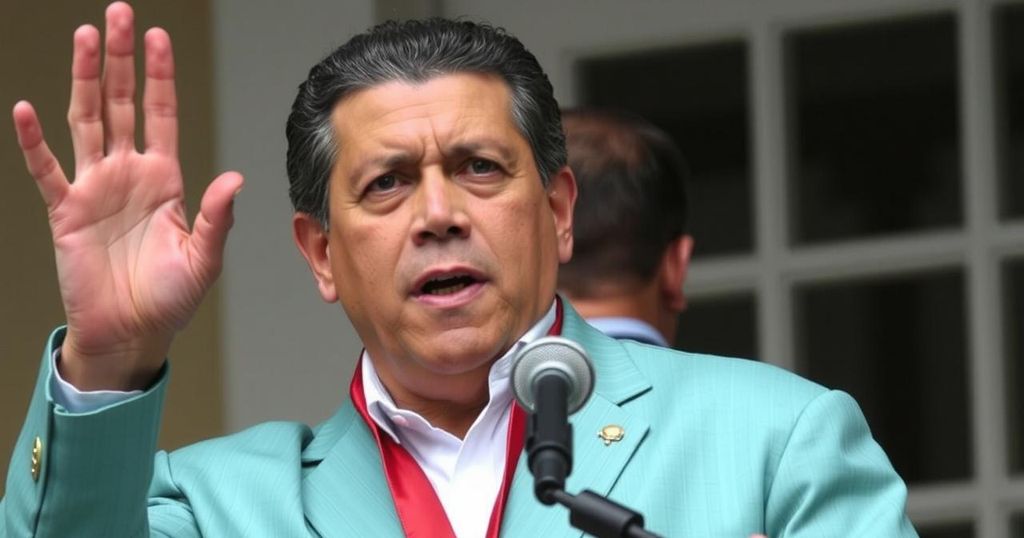Nicolás Maduro’s Contested Third Term: Erosion of Democracy in Venezuela

Nicolás Maduro begins a controversial third term as president of Venezuela without substantiated evidence of electoral victory, despite opposition claims of fraud and significant support for rival candidate González. The implications of this political climate extend internationally, raising concerns about the future of democracy in the region and complicating foreign diplomatic relations.
Nicolás Maduro was sworn in for a third presidential term in Venezuela amidst allegations of electoral fraud and without providing evidence of his electoral victory. This situation is not unprecedented for Maduro, who has been accused of manipulating elections in the past. However, this time, the opposition has presented verifiable evidence indicating that Maduro’s challenger, González, had likely won by a significant margin. Critics labeled the election as perhaps the largest instance of electoral fraud recorded in recent Latin American history.
Carolina Jiménez Sandoval, president of the Washington Office on Latin America, emphasized that Venezuela is setting a troubling precedent for democracy, asserting that a nation can disregard the electorate’s will and maintain a regime. Several countries, including the United States, have recognized González as the valid president-elect. As tensions mounted, González faced threats of arrest upon his return to Venezuela, underscoring the risks opposition leaders face under Maduro’s regime.
In the lead-up to his inauguration, Maduro’s administration took preventative measures by closing borders and deploying military defenses while allowing only a few allied heads of state to attend the ceremony. Many regional leaders have voiced their support for González, refusing to recognize the election results that returned Maduro to office. The dilemma facing the international community includes how to engage with Maduro while facing opposition pressures and the ongoing concerns of human rights violations.
As political dynamics evolve with the incoming administration of President Donald Trump, questions arise regarding future U.S. policy towards Venezuela. Prominent figures, including Senator Marco Rubio, advocate for renewed sanctions against Maduro. The inefficient outcomes of past efforts, however, create caution among international stakeholders regarding the impact of such measures, especially considering the potential humanitarian consequences of increased emigration from Venezuela.
Recently, the Biden administration pursued détente, resulting in a brief period of eased sanctions in exchange for assurances of fair elections. This agreement collapsed when Maduro’s government barred key opposition figures from participating in the electoral process and obstructed international monitoring efforts. However, electoral data collected by grassroots opposition organizations demonstrated overwhelming support for González, casting a shadow over Maduro’s legitimacy. The Carter Center later corroborated these findings, underscoring the opposition’s significant victory over the current president.
The political climate in Venezuela has been fraught with turmoil under Nicolás Maduro’s leadership, which has oftentimes been defined by accusations of electoral fraud and authoritarian governance. Elections have repeatedly come into question, with many asserting that Maduro’s victories are illegitimate and procured through manipulation. The most recent cycle saw significant international attention, with various nations and organizations closely monitoring the electoral process in light of past grievances. As Maduro strives to consolidate his power, opposition factions continue to rally for recognition and legitimacy, echoing past struggles for democracy within the region and highlighting the international community’s divided stance regarding recognition.
In summary, Nicolás Maduro’s swearing-in for a third term represents a continued trend of authoritarian rule in Venezuela, marked by contested elections and claims of significant fraud. The situation has reverberated beyond Venezuelan borders, inviting responses from nations throughout the hemisphere and raising questions about the future of U.S. foreign policy under new leadership. The challenges faced by the opposition, coupled with the complexities of international diplomatic relations, signify an ongoing struggle for democratic values and human rights in Venezuela.
Original Source: www.washingtonpost.com







